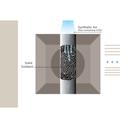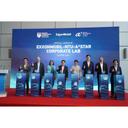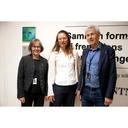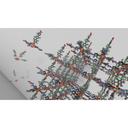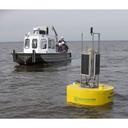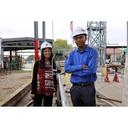Chemists at the University of Copenhagen have developed a method to transform PET plastic waste into a powerful new material for CO₂ capture. The material, called BAETA, can absorb carbon emissions efficiently and be regenerated for reuse, offering a scalable, low-energy alternative to existing capture technologies.
A University of Houston team led by Professor Mim Rahimi has developed a membraneless electrochemical amine regeneration process that achieves over 90% CO₂ removal at roughly $70 per ton, significantly reducing both costs and energy use.
An industry consortium comprised of leading steelmaker sare undertaking a pre-feasibility study to assess the development of Carbon Capture, Utilisation and Storage (CCUS) hubs across Asia. The CCUS Hub study is the first independent industry-led study of its kind in Asia and will examine the technical and commercial pathways to utilising CCUS in hard-to-abate industries across Asia.
The Global Carbon Management Foundation, in partnership with the Global CCS Institute, has launched the Global Carbon Management Academy. Backed by the Carbon Management Challenge and leading institutional partners, the Academy aims to educate, train, and build knowledge to scale up carbon management globally.
Rice University researchers have developed an electrochemical reactor that has the potential to drastically reduce energy consumption for direct air capture (DAC), the removal of carbon dioxide directly from the atmosphere.
Utah State University’s Bingham Research Center has received a grant from the U.S. Department of Energy for a $480,000 project. The grant is part of a larger project called the Uinta-Piceance Basin Carbon Management and Community Engagement Partnership, which is led by the University of Utah.
British Steel is focused on transforming the manufacture of steel into a clean, green and sustainable business by embracing electric arc furnace technology. To support this, and the development of the required technology, a mobile carbon capture pilot plant has been installed at British Steel’s Central Power Station in Scunthorpe.
A new type of absorbing material developed by chemists at the University of California, Berkeley, could help get the world to negative emissions. The porous material — a covalent organic framework — captures CO2 from ambient air without degradation by water or other contaminants, one of the limitations of existing direct air capture (DAC) technologies.
Outside the National Renewable Energy Laboratory’s (NREL's) Research Support Facility and its Café, there are two curious brick pavers unlike the others nearby. These pavers signify the quest of lead researcher Paul Meyer and team, including Julia Sullivan, Kyle Foster, Bob Allen, Jingying Hu, and Heather Goetsch, to unearth a carbon-negative alternative to traditional concrete.
A team of scientists from Heriot-Watt University is behind a pioneering platform named PrISMa (Process-Informed design of tailor-made Sorbent Materials) which uses advanced simulations and machine learning to find the most cost-effective and sustainable material-capture process combinations prior to implementation.
In new research published in ACS Sustainable Chemistry & Engineering, the team developed a technique for ultrafast formation of carbon dioxide hydrates. These unique ice-like materials can bury carbon dioxide in the ocean, preventing it from being released into the atmosphere.
A newly designed catalyst created by U of T Engineering researchers efficiently converts captured carbon into valuable products — even in the presence of a contaminant that degrades the performance of current versions.
Researchers have developed a low-cost, energy-efficient method for making materials that can capture carbon dioxide directly from the air.
NETL’s one-of-a-kind Direct Air Capture Center has commenced material-scale operations and is eager to expand partnerships with innovators that are interested in commercializing DAC technology, helping to meet the Administration’s goals of addressing legacy CO2 emissions and achieving a net-zero emissions future by 2050.
Researchers from the National University of Singapore (NUS) have developed a novel technique that significantly advances the conversion of waste carbon dioxide (CO2) into value-added chemicals and fuels.
Northwestern University will lead the newest Midwestern hub, uniting prominent partners from research and industry. The Department of Energy (DOE) is supporting early-stage project development of these Regional Direct Air Capture Hubs. The Northwestern-led hub will test the feasibility of using nuclear energy as a more energy-efficient way to capture carbon dioxide.
The National Institute of Standards and Technology (NIST) aims to facilitate the development of this direct air capture that the International Energy Agency says will be a “key technology” for combating global warming.
ExxonMobil, NTU, and the Agency for Science, Technology and Research (A*STAR) have established the ExxonMobil-NTU-A*STAR Corporate Lab to develop solutions that would help lower carbon emissions, contribute to resource efficiency, and help build a more sustainable future.
On 11 April, the Research Council of Norway announced an investment of 180 MNOK in a new research centre on carbon capture, transport and storage (CCS) in Norway. gigaCCS is a Centre for Environment-Friendly Energy Research (FME) that will advance Norway’s expertise in CCS, as well as support the global implementation of CCS at a gigatonne scale.
CGG has announced the release of a Southeast Asia Carbon Storage Study to support and accelerate the screening process for all players in the region’s fast-growing CCUS market.
The National Carbon Capture Center announced it has surpassed 150,000 hours of technology testing. This testing helps advance cost-effective and commercially viable carbon management technologies to reduce greenhouse gas emissions from fossil-based power plants and industrial sources and propel them toward deployment.
Aker Solutions has been awarded a contract by Equinor to carry out a feasibility study for its Mongstad Industrial Transformation project in Vestland county on the west coast of Norway.
Generative AI techniques, machine learning and simulations give researchers new opportunities to identify environmentally friendly metal-organic framework materials.
Research by Oregon State University scientists has demonstrated the ability of vanadium peroxide molecules to react with and bind carbon dioxide – an important step toward improved technologies for removing carbon dioxide from the atmosphere.
The University of Kentucky Center for Applied Energy (CAER) Cementitious Materials Group develops and tests cements and concretes, seeking more environmentally friendly solutions for the future. CAER’s researchers are exploring a new way to utilize CO2 to improve the performance of cement and concrete.
Southeastern Louisiana University deployed four buoys this week for the independent, scientific monitoring of the Lake Maurepas ecosystem as part of its Memorandum of Understanding (MOU) with the Federal Government and with Air Products’ work on its Louisiana Clean Energy Complex.
Highly competitive National Science Foundation Engines grant will provide up to $160 million to support Louisiana’s energy industry, create jobs and develop the energy workforce.
Mitsubishi Heavy Industries, Ltd. (MHI) agreed with The Kansai Electric Power Co., Inc. (KEPCO) to install a CO2 capture pilot plant at Himeji No.2 power plant in Hyogo, Japan.
The study urges that climate effects of CDR beyond CO2 sequestration must be considered, including permanence of CO2 storage in trees and soils, changes in the reflectivity of landscapes, and the full suite of greenhouse gasses emissions.
Petroleum Engineering Assistant Professor Jyotsna Sharma is leading a team of researchers that aim to develop a distributed fiber-optic sensor (DFOS) to monitor CO2 leaks and structural integrity in CCS sites and CO2 pipelines.
Advertisement

















